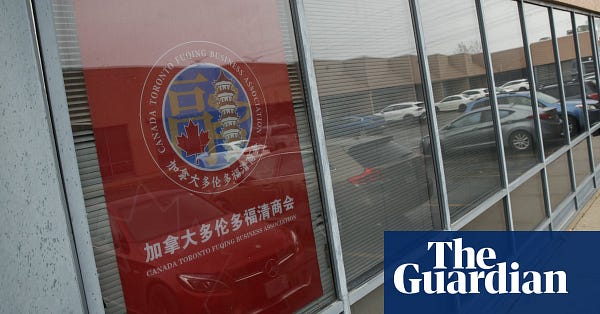For this week’s newsletter dispatch, a special focus on Canadian news stories that reflect China’s growing presence in the world—and efforts to try and push back. From investigating secret police stations, to accusations of election meddling and concern over trade, to intimidating journalists while the government keeps ordering maple leaf pins.
Secret stations exposed


Toronto is the latest place where foreign outposts operated by Beijing have been located, as part of the international uncovering of “service stations” that appear to actually be secret police operations monitoring Chinese nationals. Canadian authorities are now investigating what Beijing claims is about identifying fraud suspects and nothing else.
Manchurian trails in Canada
The Canadian Security Intelligence Service identified 11 candidates in Canadian federal elections who received funds from Beijing, something which the prime minister decried as “aggressive games.” The allegations first came on Justin Trudeau’s radar in January, but he only responded to them after a news story.
The future getting fearful
“China is an increasingly disruptive, global power,” looking to make the world “more permissive for interests and values that increasingly depart from ours,” said foreign minister Mélanie Joly in the process of foreshadowing the placement of a “new national economic security lens” on foreign investment in the Indo-Pacific strategy.
CBC News exits China


After more than four decades, the Canadian Broadcasting Corporation is closing its China bureau after recent requests for journalist visas met with silence. The bureau in a high-security diplomatic compound in Beijing, and remained open with anticipation of restaffing. CBC News will now have its reporter based in Taiwan.
The four-cent seduction
The Department of Canadian Heritage admitted to the purchase of more than six million made-in-China plastic and metal lapel pins featuring the red maple leaf of the national flag, at a total cost of $345,000. Value for money was cited as a reason for the transactions, along with international trade rules that limit homegrown purchases.










Learn about the fake Canadian election with my podcast episode here:
https://open.substack.com/pub/soberchristiangentlemanpodcast/p/the-canadian-election-deception-2025?utm_source=share&utm_medium=android&r=31s3eo
Disgraceful but sadly, not surprising. I wish I had hope for the future. When the pact between the far left libs and commie NDP has lasted so long, with no ability to remove them? We are doomed. We need drastic change. If Carney can fool and convince voters he will be different (he will be, more left!) and get them elected again, the country won't stand a chance. I would rather see 51st state, 2A et al.